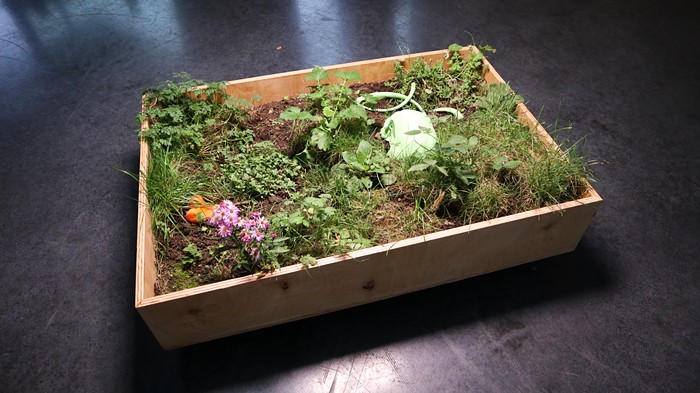This exhibition has closed; for info on ordering a catalogue, e-mail emily@thestranger.com
I wasn't holding up my end of the conversation. I couldn't see the figure in the carpet. My human spirit was failing to triumph.
Whether or not this was the result of a steady diet of writing about the works of others, I can't say. I wish I could say that attending the annual Noodleworks Invitational--called LAVA 2002 this year--yanked me up out of this rut, but that wouldn't be quite true. But I did leave LAVA feeling that perhaps the world had more possibilities than had recently been the case.
The impetus behind the exhibition's name and curatorial structure is the feeling that Seattle's art scene is ready to erupt out of its quiet and largely ignored rhythm. This may or may not be true; many of the 37 artists featured in this two-day show have been working in Seattle for a number of years (and I've written about most of them, in some cases multiple times), and it's something of a myth that a scene explodes simply because the artists are ready for it to happen. The alchemy that causes the rest of the world to wake up to a "scene," such as it is, is a much more complicated and capricious affair involving a city's cultural curiosity, and the cycle of exhibition, criticism, and viewership of art, and, not least, the collecting of it. In any case, LAVA certainly forms part of this cycle, and based on the work I saw, the news is very good.
The show was assembled by Jennifer West, Yuki Nakamura, and Claude Zervas, each of them good artists in their own rights. The spread of their areas of interest--West in video, Nakamura in ceramic sculpture, and Zervas in a range of conceptual themes that use any available media to bring them about--has resulted in a show that is varied, but also coherent, a kind of local paean to the broader thing that pop art has become. In the introduction to the lovely catalogue she produced for LAVA, Rhonda Howard speculates on the themes that these forms take (the ambivalence of the virtual world, the overriding presence of systems, the perception of the body), but I sense there's something more overarching at work here, a call-and-response to the question of art-making in a mostly inattentive community.
Now I don't think all these artists sit around their studios and contemplate ways to wake up Seattle audiences, or to perversely ignore them, but attention-getting and its reverse resonate throughout LAVA. It's not just a show of artists who are ready to erupt, but also about the condition of being ready to erupt, and this is a philosophical state that these artists seem to have responded to, both consciously and not.
Some of the artists respond with great energy--as in Cathy McClure's frenetic zoetropic films, Patrick Holderfield's beams that break through walls and make them ooze, Tim Sanders' mysteriously shuddering suitcase (an airport security guard's worst nightmare)--and some with a nod to isolation and futility: Susan Robb's knitted armlike appendage, dripping its life into a pile of dirt (mostly unresponsive, slowly altering) and Nicola Vruwink's lonely disco booths (where you can never meet yourself, since the video monitors they contain show people in other rooms).
Art has more or less always been pulled between action and contemplation, potential energy and actual. The failure to engage a viewer through either method usually spells the end of something (whether this is the art's fault or the viewer's is another question entirely); here the division forms two sides of a question that pop art has asked from the beginning: What is our relationship to the world of made objects?
I've been thinking lately about inevitability, about how the best art is its own argument for existing and how it can't reasonably take any other form. Perhaps we'll look back at LAVA and see more clearly how it spoke specifically to the time before Seattle made it onto the radar of the rest of the world. Perhaps not. For now, the show's short run tells us to pay attention to this art scene before it turns into something else; to me it said, snap out of it. Ennui is so last season.


















